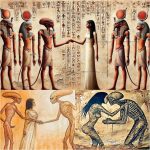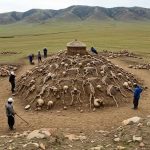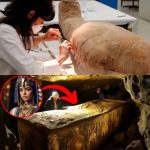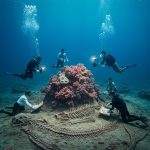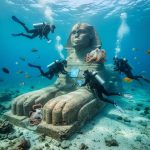Sunken Splendor: The Lost City of Thonis-Heracleion Emerges from the Deep

In a discovery that reads like a legend come to life, French archaeologist Franck Goddio has unveiled the mythical city of Thonis-Heracleion, long thought to be lost to history, lying beneath the Mediterranean off Egypt’s coast. Once a thriving hub of trade and culture over 2,000 years ago, this underwater metropolis offers an astonishing glimpse into the ancient world, revealing secrets that have been submerged for centuries.

The site is nothing short of extraordinary. Archaeologists have uncovered 64 ships, 700 anchors, and gold coins, all remarkably preserved beneath layers of sand and sea. Towering 16-foot statues stand sentinel over the remnants of the city, alongside the grand temple of Amun-Gereb, which showcases the architectural prowess of its creators. The granite streets and intricate canals suggest a bustling port reminiscent of a sunken Venice, serving as a crossroads where Egyptian and Greek civilizations intertwined.
The discovery of Thonis-Heracleion raises profound questions: How did such a vibrant city vanish beneath the waves, leaving only whispers in myth and history? According to ancient texts, Thonis-Heracleion was a vital gateway to Egypt, where merchants from distant lands gathered to trade goods and ideas. Yet, over time, the city succumbed to the forces of nature, perhaps due to rising sea levels and earthquakes that reshaped the coastline.
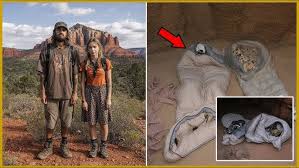
As researchers delve deeper into the artifacts and architecture of this sunken city, they are not merely unearthing material remains; they are piecing together a lost narrative of human endeavor, ambition, and cultural exchange. The artifacts found in Thonis-Heracleion provide insights into the daily lives of its inhabitants, illuminating their trade practices, religious beliefs, and artistic expressions.
This monumental find doesn’t just rewrite the past; it invites us to explore the mysteries of a civilization swallowed by the sea, waiting to reveal its secrets. Each artifact tells a story, each structure holds a memory, and each discovery beckons us to reconsider what we know about ancient societies.
As the waters of the Mediterranean continue to yield their treasures, the story of Thonis-Heracleion serves as a reminder of the fragility of human achievement. It challenges us to reflect on the impermanence of our own civilizations and the legacies we leave behind. The sunken splendor of this lost city stands as a testament to the enduring allure of exploration and the timeless quest for knowledge, urging us to dive deeper into the mysteries of our shared history.


